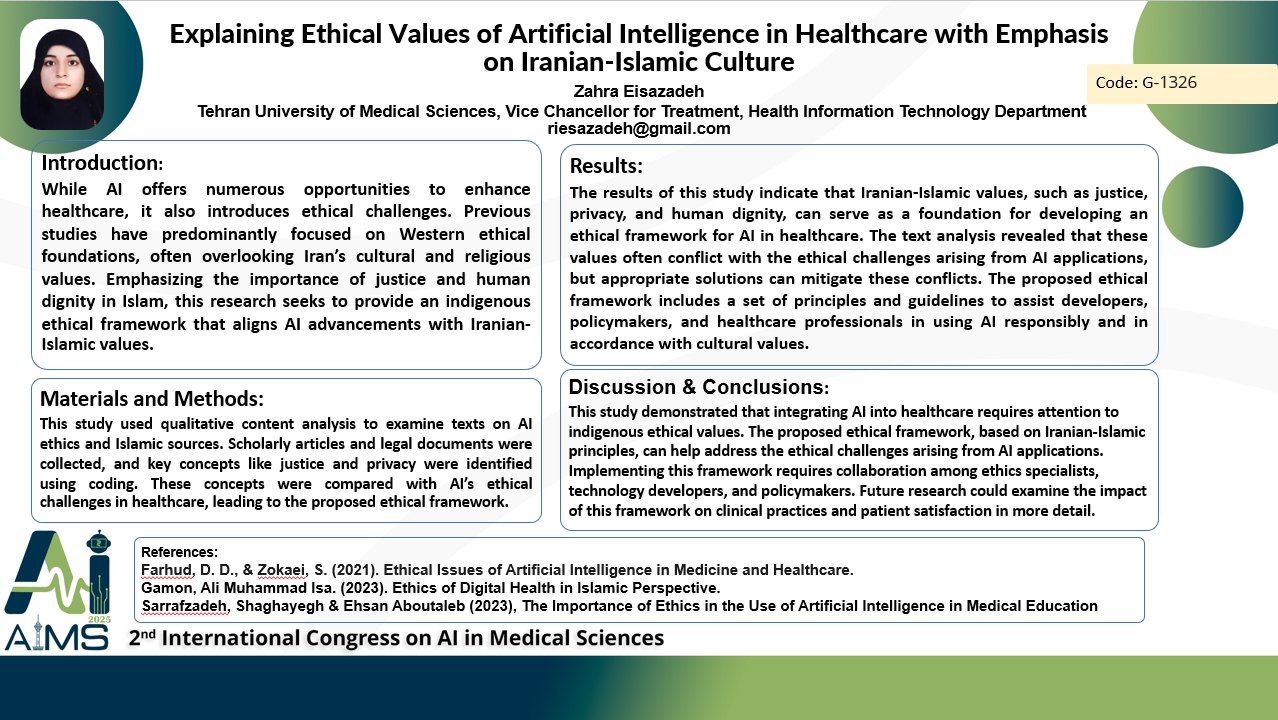تبیین ارزشهای اخلاقی هوش مصنوعی در حوزه سلامت با تکیه بر فرهنگ ایرانی-اسلامی
کد: G-1326
نویسندگان: Zahra Eisazadeh * ℗
زمان بندی: زمان بندی نشده!
برچسب: سیاست گذاری، قانون گذاری و مدیریت سلامت در حوزه هوش مصنوعی
دانلود: دانلود پوستر
خلاصه مقاله:
خلاصه مقاله
The integration of artificial intelligence (AI) into healthcare presents numerous ethical challenges and opportunities. This paper examines the ethical challenges of AI in health data management, emphasizing Islamic values and Iranian culture. The main objective of this research is to propose an ethical framework that aligns technological advancements with the fundamental principles of Iranian-Islamic culture. Background: Previous studies have primarily focused on Western ethical frameworks, which often lack depth in understanding the religious and cultural sensitivities of Iran. Islam emphasizes equitable access to healthcare services and the necessity of cultural competence in medical care. Concepts such as justice, privacy, accountability, and the preservation of human dignity hold a special place in Islamic ethics and can serve as a solid foundation for overcoming these challenges. Additionally, the use of Islamic jurisprudence principles, such as maslahah (public interest), can facilitate responsible AI governance. Methodology: This research employs a descriptive-analytical approach utilizing library resources. Data were collected from scientific articles, reference books, and Islamic sources. Data analysis was conducted based on Iranian-Islamic ethical principles and contemporary challenges in AI ethics. Results: The results indicate that integrating Islamic values and Iranian culture into AI ethics development can enhance patient-provider relationships and increase trust in AI systems. Patient data privacy must be protected against breaches and misuse, and informed consent and transparency in AI technology usage are essential. Conclusion: This paper emphasizes the necessity of creating a comprehensive ethical framework that encompasses both utilitarian and deontological perspectives. Adhering to ethical obligations such as justice and dignity not only does not hinder AI’s utility but also enhances its effectiveness. Combining traditional Iranian-Islamic ethics with contemporary AI ethics discussions can help formulate guidelines that promote the ethical development of AI in healthcare. These guidelines aim to shape a future where AI not only improves health outcomes but also aligns with the ethical expectations of Islamic societies.
کلمات کلیدی
Ethics, AI, Healthcare, Culture, Values, Integration
